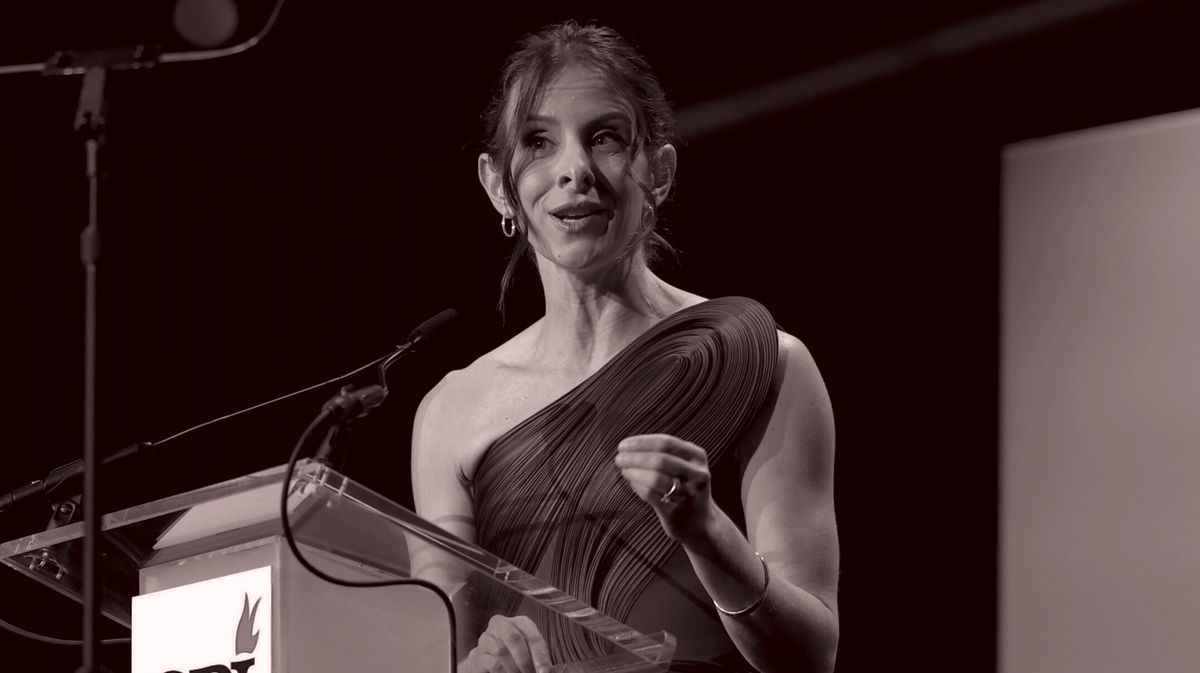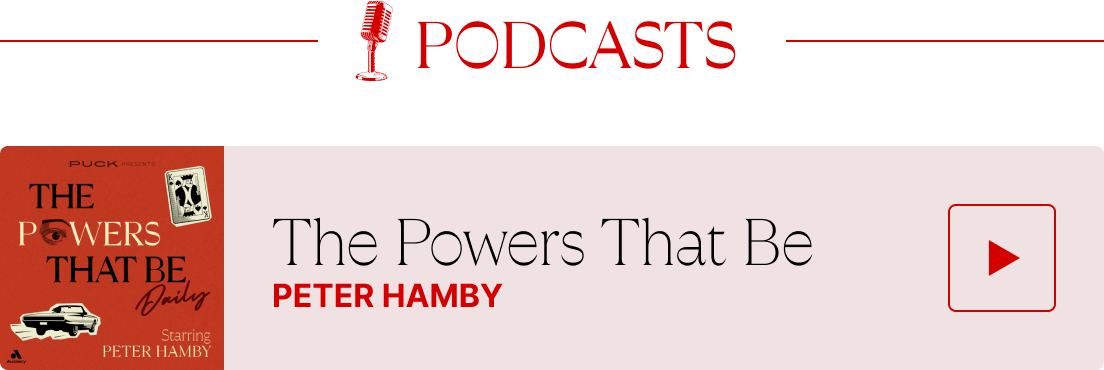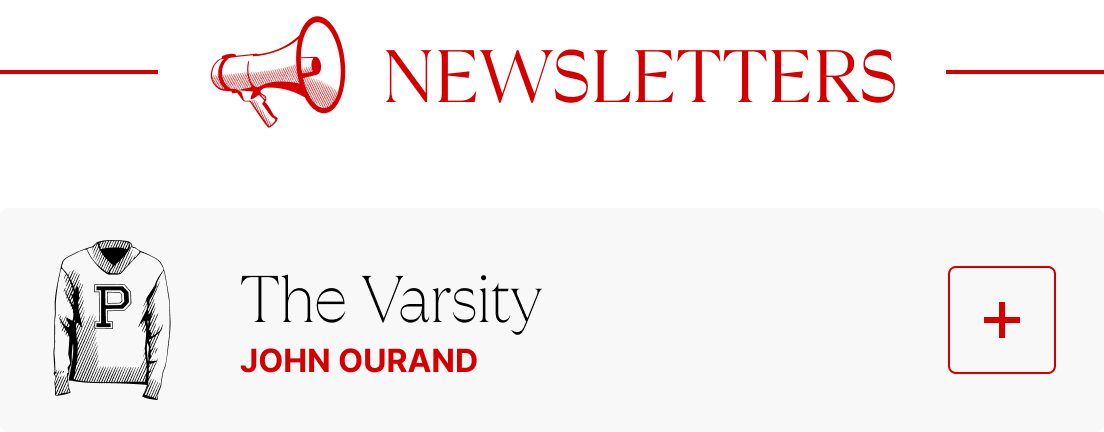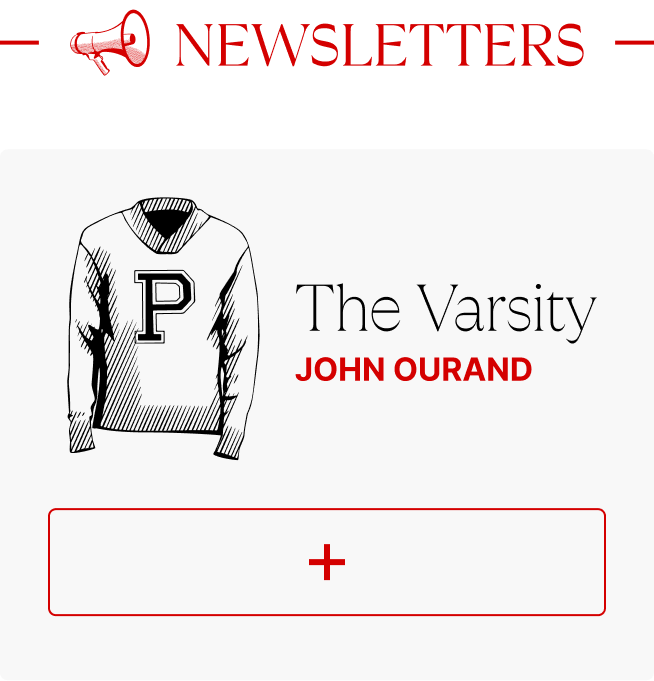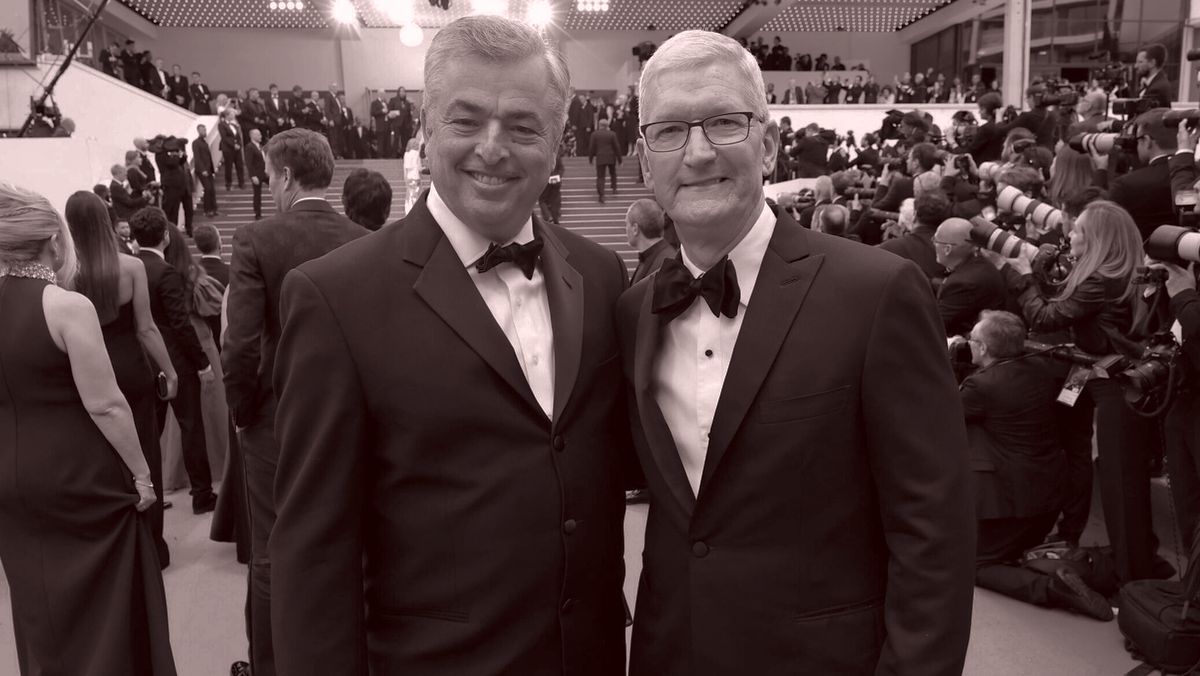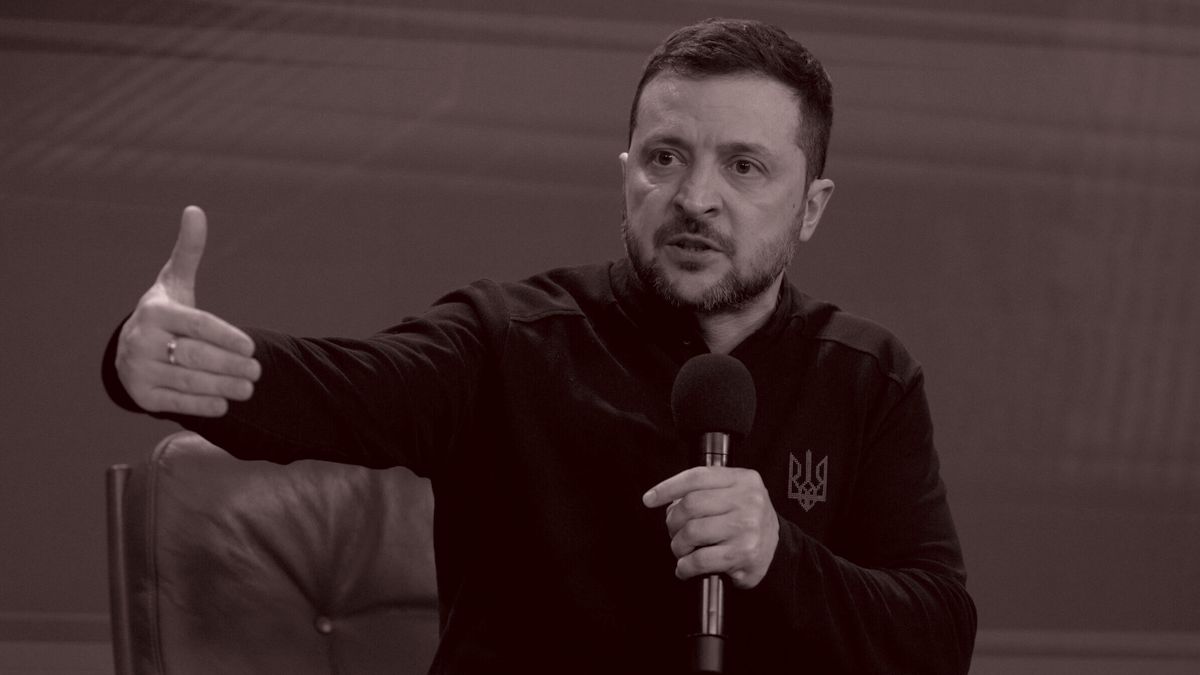Greetings from Las Vegas, happy spring, and welcome back to In the Room. Congrats
to investor Bill Chisholm on his acquisition of the Boston Celtics. At $6.1 billion, the sale surpasses Josh Harris’s $6.05 billion acquisition of the Commanders as the highest
price ever paid to acquire a North American sports team. The conventional wisdom is that this is high, especially given that the Celtics don’t own their arena. But as a couple sports franchise owners reminded me, every team trade is record-breaking until the next one, since each deal resets the market and fast. (Remember, Wyc Grousbeck bought the Celtics two decades ago for a mere $360 million.) Anyway, the Celtics are the Celtics, one of the
best brands in sports, and in time, this deal could look like a bargain.
In tonight’s issue, highlights from my recent conversation with The Information founder Jessica Lessin, and the business of using deep expertise to build loyal audiences.
🍸 On today’s edition of The Grill Room, I’m joined by Caitlin Thompson, the founder of Racquet, the tennis lifestyle quarterly that has morphed over a decade from a niche indie mag into a
multifaceted print, digital, events, and e-commerce brand. In our wide-ranging conversation about the media business, Caitlin tells me her true mission is to use journalism to grow our appreciation for the game, itself. Follow The Grill Room on Apple, Spotify, or wherever you prefer to listen.
Also mentioned in this issue: Will Lewis, Jeff Bezos, Len Downie, Bob Kaiser, Virginia Moseley, Phil Rucker, Adam Levine, Fred Ryan, Chris Licht, Lewis
Lapham, Brad Dayspring, and many more…
|
|
|
A MESSAGE FROM OUR SPONSOR
|
Medicines are the one part of health care where costs go down over time.
America’s intellectual property (IP) system is designed to make medicines more affordable for patients through innovative research, brand competition and lower-cost generics. Today, 90% of prescriptions are filled with lower-cost generic and biosimilar medicines.
Learn more.
|
|
|
- The Post mortem, cont’d: If you’ve been following the turmoil at The Washington Post over the last few years, you’ve likely noticed a theme: When shit gets bad—the nadir of the Fred Ryan era, the Will Lewis masthead shake-up, Endorsementgate, etcetera—Posties send an appeal to Jeff Bezos by way of private letter or public column, ostensibly hoping that their centibillionaire
benefactor might do something to help restore the paper to its former glory, or at least its former self. In the latest installment, the Times reports this week that Post vets Len Downie and Bob Kaiser sent Bezos a letter last month urging him to fire Lewis. “Replacing him is a crucial first step in saving The Washington Post,” they wrote.
Most often, Bezos is too busy with higher-scale
pursuits—Amazon, Blue Origin, enjoying Negronis on the Koru—to give these entreaties the time of day. But the irony, which still seems to be lost on some Posties, is that the more Bezos actually engages with his paper, the more impatient he seems to grow with the veterans’ grievances, and the more he realizes how much he wants to change it. Anyway, Bezos has not responded to Downie and Kaiser, per the Times, and I wouldn’t hold my breath.
- CNN
embraces the Ruck: Phil Rucker, the former Washington Post national editor who joined CNN in January as S.V.P. of editorial strategy, has been formally ordained as the newsroom’s chief play caller after some early friction with one of his colleagues. Rucker, who is incredibly affable and self-effacing, has been well received by most CNN veterans, I’m told. A notable exception was Adam Levine, the S.V.P. of newsgathering in Washington, who
apparently felt that the former Postie was stepping on his toes. After some mildly contentious editorial meetings and a general lack of clarity about seniority, CNN executive editor Virginia Moseley used a staff meeting to clarify “editorial roles” and make it clear that Rucker was in charge of editorial, overseeing digital and everything from the White House and the Hill to enterprise, breaking news, national security, and justice. Levine’s remit is investigative video and
linear programming.
- Politico on the P.R. hunt: As Politico’s longtime comms chief Brad Dayspring formally disembarks this week, the company remains on the hunt for his successor. Along with a slate of other candidates, I’m told that Matt Dornic, the Zucker-era CNN comms operative who went on to become Chris Licht’s loyal-to-the-bitter-end P.R. chief, has thrown his hat in the ring.
It’d certainly be an interesting move for both parties—no risk, no reward, I guess—though it’ll likely take some work for him to overcome the blemish of that infamous Atlantic profile. Good luck to all.
- And finally… I was delighted to see that my alma mater, Bard College,
has acquired Lapham’s Quarterly—Lewis Lapham’s post-Harper’s passion project that culled together works from the vast catalog of world literature and history to examine a theme. (I wrote a remembrance of Lewis, and my time at the Quarterly, when he passed last July.) “This will benefit all
our students,” Leon Botstein, the president of Bard, told the Times. “To understand how it’s possible to talk intelligently, without jargon, without the worst of self-referential academic prose, about important ideas and important controversies and complexities, which we seem not to tolerate today.”
|
|
|
Jessica Lessin, the digital media pioneer and Information C.E.O.,
offers her candid assessment of the market, shares her investment thesis, and discusses her endgame.
|
|
|
Well over a decade ago, before journalists striking out on their own was à la
mode, Jessica Lessin left The Wall Street Journal to found The Information, a Silicon Valley–obsessed news site that she has since built into a still small but formidable and profitable business. In the process, she helped ignite an important trend in media. Now, she is trying her hand as an investor, sprinkling her money around a few of the more recent media startups—Semafor, The Ankler, Dynamo, etcetera—that are hoping to achieve similar success. In a
wide-ranging discussion on The Grill Room, my twice-weekly podcast, Jessica shares her investment thesis and the lessons she’s learned over a decade, and also addresses why she has yet to eye an exit.
|
Dylan Byers: Before we get into your business, I’m
very interested in the investments you’ve been making. You’ve got money in Semafor, The Ankler, Racquet, Charter Works, Dynamo… What is your thesis going into all of these things?
Jessica Lessin: My thesis is about great entrepreneurs who have a real deep expertise in an area of the media business, and a very loyal audience that they can monetize. So it really is the formula that has worked for
The Information for 11 years. And I think, based on our experience, more and more great entrepreneurs are coming to me—especially in this moment, when a lot of them continue to leave big media. And I think despite this crazy, difficult moment in the industry, I’m very bullish on this formula and eager to help these entrepreneurs.
What is the driving indicator for you of where that audience loyalty is, or why you think a particular project might
work?
It really comes down to how their readers feel about their product, as best I can glean. I started The Information from being in the trenches at Wall Street Journal and seeing how broken their coverage of the technology business was. And so I think that also resonates with me. I have a belief that there are so many amazing business models available to great media companies at the moment, if you find that edge. So I’m not actually
looking for a ton of revenue on day one. But if they have that edge and that differentiation, I now have enough experience in sort of building up other pieces of the business puzzle. Sure, sometimes it’s the great voice of the writer, but it’s really that edge and differentiated perspective. There’s kind of been a reckoning in media. We used to think you needed audiences of millions to build these businesses. What we’re finding is, if you’re chasing those audiences, you’re likely not doing
anything different and worthwhile anymore.
|
|
|
A MESSAGE FROM OUR SPONSOR
|
Medicines are the one part of health care where costs go down over time.
America’s intellectual property (IP) system is designed to make medicines more affordable for patients through innovative research, brand competition and lower-cost generics. Today, 90% of prescriptions are filled with lower-cost generic and biosimilar medicines.
Learn more.
|
|
|
Is there an endgame for you with The Information? Do you conceive of an
exit at any point? Or is this just your own thing that you just want to keep doing in perpetuity?
I want to keep doing it. Some people ask me this question, and I go through this thought exercise, like, What if I were doing something else? And I come back around to, I would just start The Information again. I think, for whatever reason, my passion as a journalist and my interest in the future business models for the
news industry have aligned in this way where it’s tremendous work, but tremendous fun. For me, it just always comes back to being so excited about what we’re building and the team we’re building, too, which has meant that my role can continue to evolve, and I can take on new challenges.
Was there ever a point at which you thought about a sale?
No. I don’t think there’s ever been a second conversation. And I love every
first conversation, because I learn so much, especially when those large places want to talk to you. But yeah, no second conversation.
What advice would you give to, say, the folks at The Ankler or at Semafor, based on your own experience?
Well, the first thing I always say is, Raise your prices. It boils down to just having confidence in the value of what you do. Be really focused on your audience and recognize
your value to them. And I think my other bit of advice is, if you really have a hunch around the importance of some area, go even deeper than people think. Don’t listen to the naysayers; trust that gut that there’s something there. That’s basically my thesis across The Information and these other investments as well.
When you consider how much you’re charging—which I think is actually a steal for the consumer—how did you set your annual price tier at
$400?
My main bit of advice is, test, test, test. And you can really test everything, from at what line the paywall hits to pricing. Pricing can be a little tricky because you don’t want to have multiple messages out there and confuse people or piss them off. But there’s still a lot you can do on that front. So I think, just really embracing that.
What I did on day one is, just guess. I talked to five or six people who I thought
were in our demo—which ranged from people starting their first company to the biggest hedge fund moguls out there. Of course, we got wildly different numbers, but what I came around to was similar to The Wall Street Journal and a little less than the Financial Times. The short answer is that it’s been working really well, so there hasn’t been a need to rock the boat.
How many subscribers do you have?
We
don’t share our numbers, but our paid subscribers, and our newsletter subscribers (because we have some free newsletters), is well north of 700,000 now. A small portion of those are paid. And yes, they’re different. Valuable in different ways, but very different.
Have you tried to grow and build out an advertising business?
I’m excited about our advertising strategy. We’re not ad supported—we’re probably 80 to 90 percent
subscription driven. But I think there’s still a meaningful advertising and sponsorship business for us because we have such a unique community. We’re going to be aggressive at trying things there, but it won’t look like the traditional advertising business. Ours is much more about finding great partnerships. And our events are a big part of that, too—and our newsletters, because they go really deep into certain franchises.
What has your reaction been to Silicon Valley’s embrace
of Trump? How have you responded to that, and how has that influenced your work at The Information?
It’s a fascinating time. And I think it’s constantly changing. So I’m constantly telling the team, just because we’ve seen this bug rush of tech support for Trump doesn’t mean that’s going to be the picture three months from now or six months from now. More than anything, our reporting is focused on, where’s the delta? And what’s changing? Because
I think there’s going to be a lot of it.
Trump has given leaders in Silicon Valley and other business leaders permission to do a lot of things they wanted to do. There has been a lot of anger around regulation, around things related to D.E.I., around so many of these things that I think tech leaders felt constrained and crippled by. And I think Elon and Trump have given them permission to quickly change course.
But I don’t know what the future is going to bring.
And I think there are already some cracks emerging. Pretty much every major technology company has a huge antitrust trial before the F.T.C. or the D.O.J. And there’s no sign that Trump’s F.T.C. is going to go soft. So I think we’re still very much in chapter one of the story.
As tech and the Valley have grown, it’s less of a monoculture—on many things, not just who you vote for. There’s this real perception and reality around a very Democratic monoculture, but I think the monoculture idea
is just breaking down as the industry grows on a lot of vectors. I think that’s also part of the political transformation.
But we’ll see. The image at Trump’s inauguration of all those tech leaders standing behind him was really something. But he won’t have another one of those. If there was a midpoint where he decided to have another celebration, I don’t think it would look the same. I think things are going to get a little more complicated.
|
|
|
Join Emmy Award-winning journalist Peter Hamby, along with the team of expert journalists at Puck, as they let
you in on the conversations insiders are having across the four corners of power in America: Wall Street, Washington, Silicon Valley, and Hollywood. Presented in partnership with Audacy, new episodes publish daily, Monday through Friday.
|
|
|
A professional-grade, insider-friendly tip sheet from John Ourand, the industry’s
preeminent sports business journalist, covering the leagues, agencies, media deals, and the egos fueling it all.
|
|
|
Need help? Review our FAQ page or contact us for assistance. For brand partnerships, email ads@puck.news.
You received this email because you signed up to receive emails from Puck, or as part of your Puck account associated with . To stop receiving this newsletter and/or manage all your email preferences, click
here.
|
Puck is published by Heat Media LLC. 107 Greenwich St, New York, NY
10006
|
|
|
|




